Childhood Memories
As a child, everything seemed bigger. The cherry plum trees seemed enormous. When my brother Clive was mean to me; I’d go into the house and put on a Fair Isle beret and come out assuming he’d think I was a different person. I’d meet him under the plum tree expecting him to be nice to me again because I was someone else. Sometimes it worked.
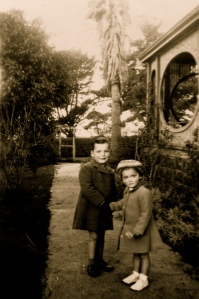
Clive and Barbara
Nigel was born on 15th September 1953; I then went to stay with my best friend Penny Russell’s family at the Harbour Master’s residence. They had three girls who welcomed me and made me feel, at seven, part of the female fraternity. (That doesn’t translate to the feminine, maternity). My eyes were opened seeing them groom themselves; eyebrows being plucked, something I’d never seen before.
Unfortunately, my mother had forced me to have my plaits cut before Nigel’s birth. She had chased me around the house the night before and given up, but the next morning she’d just chopped off each plait. My front tooth, that I’d knocked out when I was two, had regrown without enamel. After the freshly enamelled tooth treatment, at great cost, it was knocked out again, playing on a broomstick. Looks were never something I felt confident about. Myrtle Russell tried valiantly to give me confidence, telling me I had beautiful eyes. No one in our family believed in giving compliments to children.
Penny listened to 7AD (the local radio station) and there was a popular song at that time, ‘How much is that doggy in the window,’ which we all sang with great gusto in the girl’s bedroom. I loved learning this song, as we didn’t have 7AD at our house. Penny was much more worldly than me because she went to the cinema, or as we called it, the pictures, every Saturday afternoon. I had seen about two movies before I started High School. ‘Snow White’ was the first. I was lost when Penny talked about film stars, trying to soak up what she told me. My Mother wasn’t one for wasting money on magazines. Though she did break this rule after the Royal visit, so that I could make a scrapbook for school. This was a large hard covered folder with brown paper pages, devotedly completed using the home- made flour and water glue to stick the latest photos and decals of the Royal family.
Penny and I both collected swap cards. Our mothers played cards and so we were off to a good start, as we collected the jokers that were not needed in the packs. I was fortunate, too, because Auntie Mary gave me her swap cards. The older cards had gilt edges, some were textured, or had gold and silver added to their designs. The new Coles swap cards had many sets, but didn’t compare to the older cards. So when one had doubles, one could get several Coles cards for one older style, if it was in good condition.
I was upset, when my father picked me up to take me to tell my great-grandparents that my third brother was born, as I had hoped for a sister.
Mother’s two weeks rest at Meercroft Cottage Hospital was the norm after a baby was born. There she had double doors that opened to the outside, so that we could visit her. Children were not allowed inside, so we crept in very quietly.
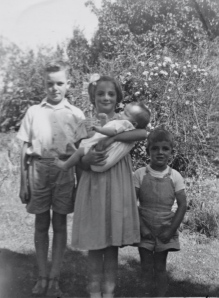
Clive, Barbara, baby Nigel and Graeme
At 2, Nigel’s blonde curly hair was quite angelic. He was soon climbing into my bed in the early mornings to snuggle up. I remember the warmth, and then the bed would go cold – wet. I did love having another brother.
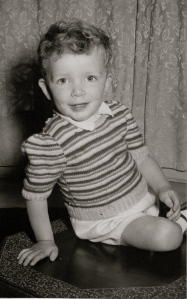
Nigel
Our father would always get up first to put on the porridge. It was quite a tradition that he used ‘chicken feed’ and oats soaked overnight. My mother would bathe, as breakfast was well underway.
When I became a little older, I decided I hated porridge, and vomiting back into the bowl proved to be the only way I could convince my parents that I no longer needed it. They then accepted this. Dad would often have eggs and bacon after his porridge, then toast and tea before pedalling off to work on his bike. We would all have eggs at the weekends; having chooks, eggs were plentiful. Tea replaced milk to drink, and I enjoyed toast; the homemade grapefruit marmalade made me sneeze repeatedly, every morning.
Building our bonfires in the May holidays for Empire Day 24th May was another tradition. Victoria Parade at that time was not manicured as it is today. We’d drag home dead branches from the whole neighbourhood to the empty block of land opposite. Old tyres were kept until last in case another gang burnt our bonfire down before the night. Eventually we invited the Stone twins, the rivals, to share our bonfire, to save it from destruction. My mother made red toffee apples for everyone in the neighbourhood on bonfire night.
The year Angus was born, we organized the bonfire a night early. Pregnant Mum, after distributing the toffee apples, had another tray for everyone to put their crackers on so that they could be dispensed throughout the evening. Unfortunately, someone put a live cracker on the tray, and my mother dropped the lot as they all began to explode. Flowerpots and spinning wheels along with the penny bangers all went off at once.
This set off her labour. Angus was born early next morning, on 24th May 1956. What a cracker of a baby he was.
This time, my mother had organized a housekeeper to come in and look after us all. She was called Mrs. Roberts, no relation. Immediately taking charge, ‘I don’t need any help from you, I’ll find things myself.’ I felt very put out, as my mother had asked me to help her. When we came home from school, ‘Here’s a biscuit and drink. Now, stay outside and play, I’ve just cleaned the floor!’ her pommy voice resounded. The meals were dreadful. One in particular stands out: boiled vegetables and meat surrounded by watery, fatty soup. It was neither soup nor a ‘proper’ meal, as we knew it. Even our unfussy father was perplexed, but diplomatically said nothing. We were all relieved and delighted to have Mum home two weeks later with little Angus.
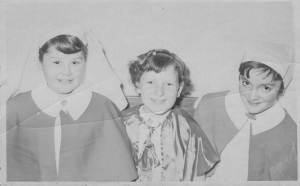
Penny Russell, Jill Brooke, Barbara Roberts at a fancy dress party.
Penny Russell and I would play for hours after school and holidays, mostly outdoors. One play space was in the outside laundry with the copper. This was before my father built the playhouse around the plum tree, which had white-framed windows on two sides and a door at the front, the whole house was painted in sump oil. At this time I asked my mother, ‘Why do girls marry boys?’ I thought Penny and I would be quite content to live together as adults. My mother wisely said, ‘Just you wait and see.’
Nigel had invisible friends. ‘Mum, stop the car!’ Nigel would cry, ‘Stop! Santa and Robber have been left behind.’ Stopping, opening the front gate to let them out, before putting them into the car was a regular ritual. Nigel’s best friend was Sandy Budge. We would listen to them talk about their future. ‘When we get married, we won’t go to Holland for our honeymoon because we don’t want any Dutch babies.’ They must have fallen out with their Dutch friend at that time.
Graeme’s inventiveness didn’t lead him to become a scientist as we expected, with his
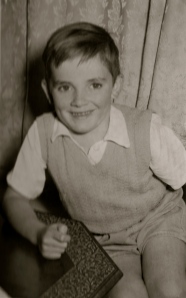
Graeme
pottering about making experiments in the outside laundry. One Christmas, I unwrapped a soap shaker for washing up, consisting of old bits of wire and some velvet soap encompassed by mesh he’d scrounged. I was thrilled, as we children didn’t give each other presents, so this made it very special.
Besides Penny, I played with closer neighbours, Elspeth McIntyre and occasionally Valery Gray, though she was a year older. Elspeth and I hid in the broom cupboard as Mrs. Gray complained, ‘Those girls are being mean to my Wallie.’
My mother remonstrated, ‘I don’t get involved in the children’s scuffles. I’m sure they will sort things out for themselves.’ Mrs. Gray left feeling thwarted. We crept out of the broom cupboard when they had gone to the back door feeling elated. I was proud of my Mum for standing up to scary Mrs. Gray. Elspeth and I would always run on our way past the Grays because she would sometimes shout and swear at us. Her behaviour was bewildering; in retrospect, was she was menopausal?
Not accepting rides with strangers was one of the rules we abided by; even when Tom O’Meara, a close neighbour offered to bring Clive and me home when it was pouring with rain. He was the local bookmaker. He was a kind man and must have been amused by our reticence. His children went to the Catholic school. In those days there was a division between Catholics and Protestants, though I didn’t understand why. I was fascinated by some of the Catholic paraphernalia, such as little cards of the Virgin Mary and writing in green or purple ink. At our house the ink was either black or blue.
Birthday parties were held and sometimes school friends were invited. Whilst at primary school, my mother made a magnificent birthday cake with a doll in the centre with a decorated skirt of icing. I was delighted and my Mother was particularly proud of this effort. She also made cone shaped biscuits folded to contain cream and jelly, creampuffs, lamingtons, fairy bread and the table was laden with food.
I seem to remember other people’s birthday parties more than my own. Moments like, the dentist’s son, Stephen, who had been deprived of sugar, picking off all the icing off the cakes and having a wonderful party before being discovered. We saw quite a bit of our cousins that lived in Launceston, as they would come to visit our grandparents.
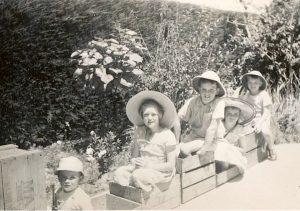
Graeme, Mary Elizabeth, Clive, Barbara and Peter
At that time there were no supermarkets. Our general store was the Don Store, where everything was weighed out into paper bags. My mother bought flour and sugar in large sacks. Some people bought their biscuits by the pound, but we always had homemade biscuits. Bought biscuits were considered a treat. Homemade butter was available, and it was always a deep, rich yellow. At the Don Store the money was put in a container that was fired on a wire to an accounts office raised above floor level in the centre of the shop, pulpit-like. Any change was sent back by the same method. Mr. Atkinson with his rounded glasses and large white apron, almost to the floor, wrote pencilled dockets and practised mental arithmetic.

Open air fires were great fun. I hope you cooked marshmallows over your camp fires! 🙂
LikeLike
The bonfires sound like fun! And the toffee apples! We never really had outdoor fires except at camp or when camping out and then I LOVED them!!
LikeLike
I love it when you elaborate on a bit of memory. There seems to be more detail from the bonfire building on. With your plots being cut off, I wanted to know more about how you reacted and what you felt.
LikeLike
Hilary, I am still not sure how long this should be… whether to make one story out of childhood and one of adulthood,
or just one story? I find it hard to know how much elaboration should be included. I shall keep your comment in mind as I go on….
Thanks for your feedback. ❤
LikeLike
Very nicely done Barbara, all about kids. These are always fun chapters of a story! I liked it! 🙂
LikeLiked by 1 person
HJ, I do appreciate your reading this and giving feedback! 🙂
LikeLike
Lovely, Barbara, I’d forgotten swap cards.
LikeLiked by 1 person
They were my treasured possessions! 🙂
LikeLiked by 1 person
Hey, nicely done! That was a very enjoyable read. Thanking you for sharing! 😊
LikeLiked by 1 person
Lovely to get your feed-back, thank you! 🙂
LikeLike